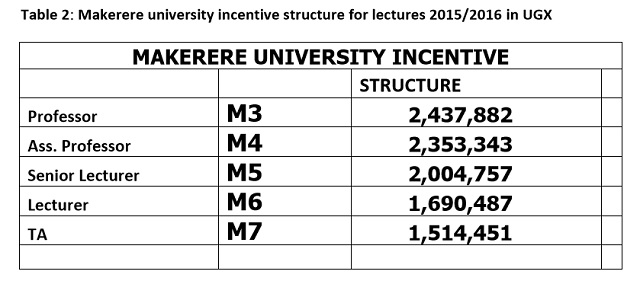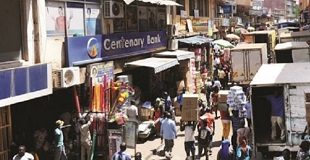Yet strikes by Makerere academic staff are not new. They have been the major instruments they use to force government to increase their pay. In 1987 they were demanding a “living wage”. While their cause was genuine then, today Makerere lecturers are demanding a “luxury wage” that goes beyond the means of a poor country like Uganda. In 1995 lecturers went again on strike over pay, paralyzing the university. They have gone on strike consistently since. In order to understand the problems of pay at Makerere, let us address them with a historic perspective.
The first question is: has government been insensitive to the pay of its lecturers at Makerere? In 1987/88, the year of currency reform, and the year when Makerere lecturers first went on strike under the Museveni administration, the salary of a professor was Shs 4,355. When adjusted to inflation, it comes to Shs 272,928 in 2015 prices. By 1990, this salary had increased to Shs 13,000. When adjusted to inflation, it comes to Shs 92,000 in 2015 prices – a significant decline in real terms over three years. See Table 1.
However, by 1995/96 this trend had begun to reverse. In that financial year, the salary of a professor had reached Shs 447,893. When adjusted to inflation, it comes to Shs 1.55m in 2015 prices. This shows that between 1990/91 and 1995/96 there was a 1,585% real increase in lecturers’ wages. Yet in spite of that, Makerere lecturers went on strike over pay. Today the salary of a science professor before the aforementioned “incentives” is Shs 8.03m while his counterpart in the humanities is 7.1m. This means that since 1990, the earnings of a professor at Makerere have increased by 61,357% in real terms from Shs 13,066 to Shs 8.03m (for a science professor) and by 54,237% to Shs7.1m for a professor of arts.
We can demonstrate this in another way. Uganda government revenue in 1995/96 was Shs 627 billion (Shs 2.172 trillion in 2015 prices). Total government budget for 1995/96 was Shs 1.014 trillion which, when adjusted to inflation, comes to Shs 3.5 trillion in 2015 prices. Uganda’s revenues and budget have grown immensely over the last 20 years to Shs 13.5 trillion and Shs 21 trillion respectively today. How have Makerere lecturers faired?
Government has consistently increased the wages of lecturers are Makerere at a rate faster than the growth in per capita revenue (total tax revenue divided by the population) and per capita spending (total government budget divided by total population). In 1995, Uganda had a population of 20.78m. In that year, per capita revenue was Shs 30,173 or Shs 104,550 in 2015 prices and per capita spending was Shs 48,796 or Shs 169,000 in 2015 prices. Today, with a population of 40m, per capita revenue is Shs 337,000 and per capital spending is Shs 525,000.
Now we can illustrate our point: in 1995/96, a professor’s salary was 15 times the per capita revenue and 9.2 times of per capita spending. Today a professor’s salary of Shs 8.03m (before incentives) is 24 times the per capita revenue and 15.3 times the per capita spending of Uganda. With incentives a professor’s salary is about Shs 10.5m i.e. 31 times per capita revenue and 20 times per capita spending as Table 5 shows. Across the board, salaries of lecturers in all categories at Makerere have increased much faster than growth in per capita revenue and per capita spending.
In fact as Table 1 demonstrates, the last three years have seen an unprecedented increase in the salaries of lecturers at Makerere. Since 2013/14 the salary of a professor and by extension all other categories of lecturers have witnessed growth of not less than 152%. Table 3 shows both the nominal (currency denominated Shillings) and the real (after adjustment to inflation) percentage increase in the salaries of all categories of lecturers since 1995.
This brings us to the second question: are Makerere lecturers poorly paid? How do we judge this? One way is to compare their wages with those of other lecturers in private universities in Uganda. I have done a survey and the average wage of a professor in private universities is Shs 5m, far below what government pays its professors at Makerere. The other way is to compare the pay of lecturers at Makerere with other public sector employees, like teachers, medical workers but especially civil servants.
The highest paid civil servant in Uganda is the head of the civil service. In 1990, his salary was Shs 12,155 which, when adjusted to inflation, comes to Shs 86,307 in 2015 prices. Today, the salary of the head of public service is Shs 4.9m. This shows a 5,577% increase over 25 years compared to a professor whose increase is 8,718%(for sciences) and 7,717% (for the arts). Indeed, all other civil servants wages including permanent secretaries have increased at a slower rate than for Makerere lecturers.

Makerere university lecturers went on strike because of unpaid “incentives”. Table 2 shows the amount of money each category of lecturers would earn if they these incentives were paid. And all this does not include the fact that many lecturers at Makerere, especially professors and associate professors, get free accommodation whose market value can be equal to their salaries i.e. they live in houses which, if they rented them, would cost $2,000 (Shs 7.2m) per month.
Then I checked with PriceWaterHouse Coopers, the firm that does annual studies on the relative wages in all companies and organizations in Uganda. Except for top and senior executives of large private firms like big banks, international audit firms, telecoms and the breweries and a few government agencies, lecturers in public universities in Uganda are among the most highly paid people in this country. Secondly, Makerere lecturers see themselves as a special category that should be pampered by taxpayers at the expense of everyone else. That is why they constantly use strikes to blackmail government to pay them more and more.

 The Independent Uganda: You get the Truth we Pay the Price
The Independent Uganda: You get the Truth we Pay the Price



“The lecturers strike at Makerere also could be seen as unfair for another reason. Currently, the university has total enrolment of 39,546 students of whom only 6,324 are sponsored by government. This means that 33,222 students are self-sponsored i.e. their parents, guardians or themselves pay fees from which 23.4% of lecturers’ salaries are paid. To refuse to teach when privately sponsored students constitute 84% of the total student population is unfair.”
In my view, the unfairness of the lecturers to teach should not have been compounded with an even more arbitrary measure by Government to close the university. If security was the problem, the state has the capacity to ensure security of the property and lives both within and outside the University.
The university should have remained open to the 84% private students to enable them access the library for research and continue to benefit from the other amenities like accommodation, meals and etc that they have equally paid for. Even the 16% public sponsored students could have been advised to retain the university for library research as Govt sorts out its responsibilities to its staff. All decisions that the Leadership of Makerere made were with the blessing of the Mother Ministry and all avenues thus existed to solve the problem before it escalated to the point it did. A government loses appearance of control if its perennially in fire-fighting mode.
In a world of advanced e-learning, lecturers form a dying breed of academicians. What the students paid for and desired above all were the facilities and environment to study and research. If government needed to close down anything, it could have suspended its sponsorship program of the 16% Govt aided students so that the incentives package of the lecturers fits within the budget supported by revenues collected from student tuition.
That way it would be left to the public to determine the level of service that the ruling party is offering and whether its in line, or not, with their aspirations as voters and stakeholders; unless off course the state sought to thwart a larger threat with political connotations…
1.Makerere University staff & those from other Public universities are among the top 10 well paid Ugandans. They know this but they are just big headed most graduates are applying to be office attendants coz they are paid 800k they hide their degree transcripts & strategically submit their O’level during interviews.
2. The university was closed coz of big headedness on the part of both students & staff we had to deflate their heads abit.
3.It would be better to have 2 categories of permanent staff i.e those employed to teach govt students & those to teach private students otherwise the fees collected from private sponsored students is seen as mana from heaven.( i am told each lecturer has a calculator to compute fees collected from private students that’s why their appetite for cash is high)
4.Most Ugandans believe that govt should be bullied into submission whether they work or not actually, most staff at MUK are on sabbatical leave they get full salary from MUK and abroad.(isnt this abuse of office?)
5.The economy class of planes departing from Entebbe is filled to capacity with lecturers traveling to present papers abroad you wonder when they teach.
6.There is a craze for all lecturers to have PhD’s they are actually getting PhDs haphazardly through staff development Commitees will the aim of “catching” the 15m M7 promised .
7. The Title Assoc.Prof or Prof is so simple to obtain especially in the humanities field of study. One just needs to attend conferences even if its in Kasese then paid someone to vet your publications then you are good to go.
8.I find it so funny that most civil servants will serve the nation for over 40 years with a low pay without quitting what does this mean?it means that most civil servants cant be employeed in reputable institutions coz of their bad manners & poor working ethics.
9.Ugandans are found of using govt institutions as a stepping stone for their selfish interest and they are not ashamed to do so e.g Govt funded the studies of Godber Tumushabe ,Onyango & Nuwagaba Justus but they are our biggest critics they charge govt for advise they have forgotten that govt is the biggest marketing manager of all ugandans abroad.
10.Dr.Nyanzi Stella undressed coz of the money.
But, in case you are in New York City, it is
really not possible for many to get a bag for $1,000.
Since most branded merchandise is highly priced, we need to seek out other
ideal and smart ways to enjoy the good thing about them.
There are even diaper bags which do not even seem like diaper bags from your outside.